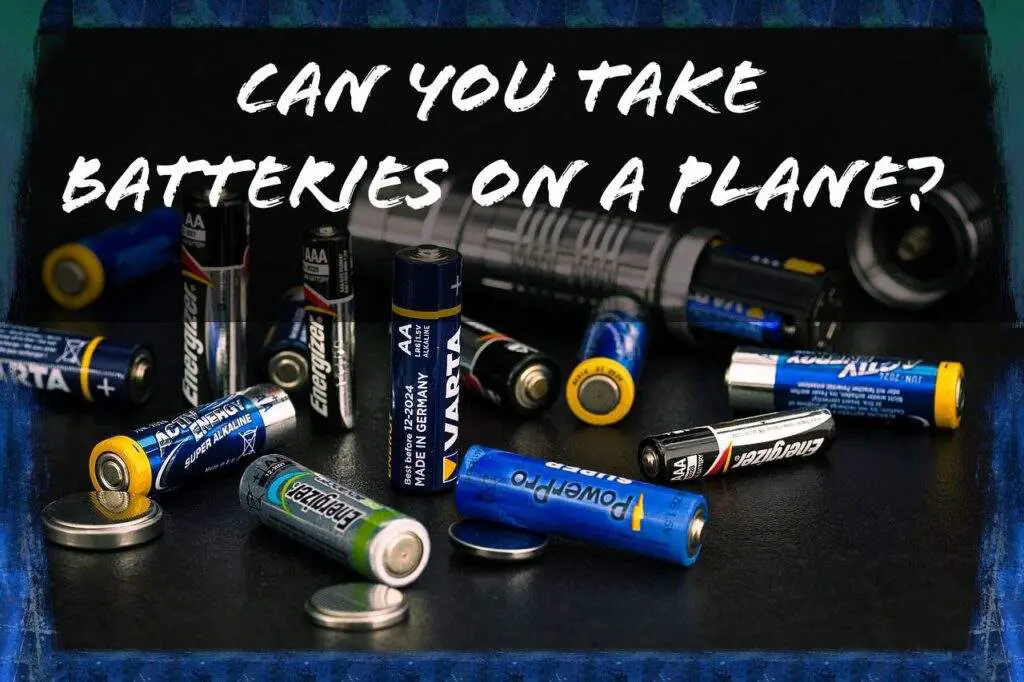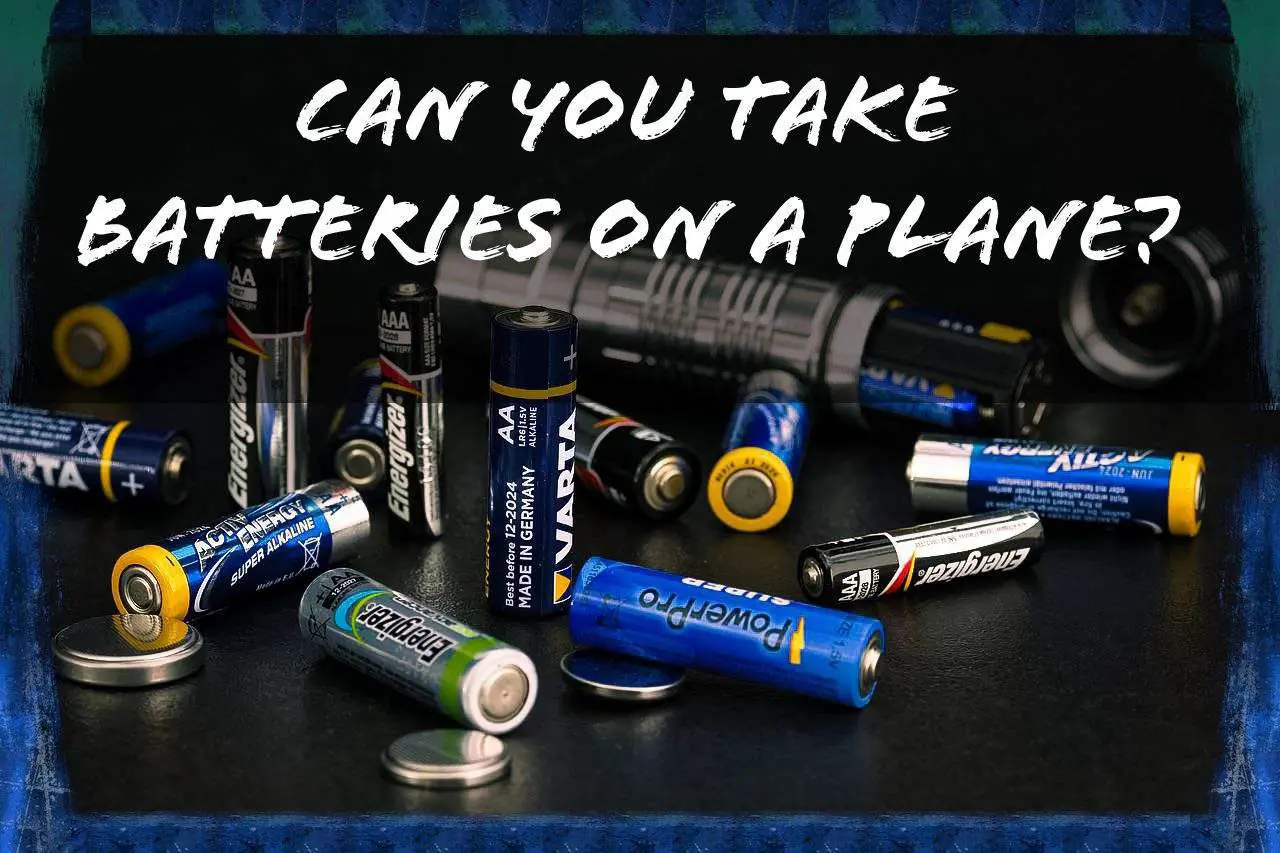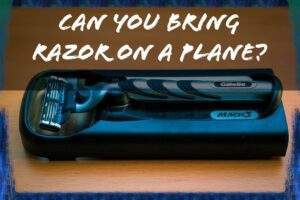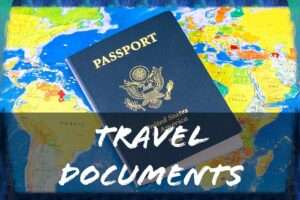If you’re a person who loves to fly or travel in general, you may have been asked the question of whether you can take batteries with you on a plane. In this blog post, I’ll answer this question and also provide some helpful tips for flying with batteries!
Batteries can sometimes be a bit confusing – not can you take batteries on a plane, but what kind of batteries can be brought on a plane?
Many countries have restrictions on which types of batteries can be flown internationally and which types cannot. We’ll break down what you need to know in order to travel with your devices battery life intact!

This article will tell you everything you need to know about taking batteries on a plane. You’ll learn where you can pack batteries in your checked baggage, how many batteries you can take with you in your carry-on bags, and what types of batteries are safe for air travel.
What type of battery is not allowed on airplanes?
Check your battery to see what type it is. If it’s a lithium ion battery, then you should not take it on the plane.
Depending on the type of battery, some are not allowed to be taken on a plane. For example, lithium ion batteries cannot be transported if they have a cell rating higher than 100Wh/cell or 20g of mass per cell.
You are not allowed to take lithium ion, lithium metal or any type of rechargeable battery that contains lithium on an airplane. The reason is because the batteries are considered hazardous materials and could cause a fire if there was an issue like an electrical short-circuit.
You are not able to take lithium ion batteries on airplanes. You also cannot put these batteries in checked baggage. If you have a laptop or other device that has a lithium ion battery, you will need to bring it with you on the plane.
There are three types of batteries that should not be brought on a plane, lithium ion, nickel metal-hydride and lead acid. Lithium ion and nickel metal-hydride are the most likely to cause issues while lead acid can be hazardous in extreme heat.
What kind of batteries can you take on a plane?
There are a few batteries that can be taken on a plane, like those in mobile phones, laptops and other approved electronics. The FAA does not allow you to take any battery for a personal item onboard the plane unless it is sealed in its original packaging or it has been made safe to use.
The prohibited batteries include car batteries and stoves, but you may live other larger nickel cadmium, lithium ion or lead acid (like those in an electric car) that is either already installed or contained within equipment. Check with your airline before traveling.
Some airlines require passengers to remove their laptop or other electronic devices from carry-ons and put them through screening separately – so having a fast charger handy might not be such a bad idea!
There are some restrictions on the number of allowable batteries that you are allowed to bring along with you at any time. So make sure to check the specific airport requirements before heading to your next flight!
Can you take batteries in carry on luggage?
There are rules for bringing batteries on carry-on luggage, and a dependable battery charger. Most airlines have restrictions on the number of batteries, size, type and watt hours. Speak with an airline contact before packing your bags as it is best to anticipate any in-flight power needs.
Different countries require you to follow different rules when it comes to the batteries. In Australia, the battery must be under 100 watt hours and in carry-on luggage.
But in some places, lithium batteries are not allowed on airplanes at all. As a general rule of thumb, though, you should check with your airline or prepare to have the contents of your luggage for checked baggage.
Batteries can not be placed in any carry on luggage, and instead need to be checked in. The following batteries are all included: lithium ion, coin, button cell, 10-28 amp hour car (lead acid), gel cell, nickel cadmium, nickel metal-hydride, or passive lead acid.
Lithium ion batteries can only be damaged by severe overheating when they start to swell and put pressure on the enclosure. Lastly the battery must have a charge equal to 40% or less.
Can I put batteries in checked luggage?
Not all airline companies allow passengers to place batteries in checked luggage, however there are some that do. It’s best to contact the airline before flying with a question like this and always follow the instructions on their website.
In most cases, passengers can take batteries in either checked luggage or carry-on luggage. All types of dry cell batteries are allowed, including nickel-cadmium and alkaline types.
There are some restrictions on lithium ion laptop batteries, but they should be declared at the passenger checkpoint by explaining that they contain lithium ion, as per current TSA policy.
Can batteries be carried in hand luggage?
The Transportation Security Administration (TSA) regulates the transportation of lithium ion and lithium metal batteries in carry-on bags and checked baggage. These batteries are not allowed in either checked or carry-on bags, unless they are installed in the device, such as a laptop or cell phone.
Batteries can be carried in hand luggage but they must be saved to power the devices before they are packed away. You also shouldn’t mix batteries of different chemistries.
What about toys with batteries in checked baggage?
Most toys with batteries are allowed in checked baggage but you should check with your airline. It is also important to keep an eye on these items since they can easily overheat and start a fire. You should never pack these toys with clothes or other items that could start a fire, such as paper products.
Small toys that have lithium batteries in them should not be put into checked baggage. The reason is because they can catch fire and cause a lot of damage. If you’re packing your child’s toy in your carry on, make sure the toy doesn’t have a battery or has been taken out of the battery compartment.
How many batteries can you take on a plane?
You can bring up to two primary lithium ion batteries on a plane, each no more than 100 watt hours and not exceeding the size of 16.4 ounces or 450 grams. You are allowed to bring one spare battery, up to 100 watt hours or 16.4 ounces. Batteries that exceed any of these limits cannot be brought onto a plane.
Different types of batteries have differing amounts of restrictions, and the size and capacity of the battery also play a role.
Since each passenger is limited to bringing two checked bags and one carry-on eligible for some liquids, you should only bring a few camera batteries or an iPad charger instead of multiple chargers.
Can you take lithium batteries on a plane?
Yes, but there are certain restrictions. While lithium-ion batteries are allowed on board, all batteries must be properly packaged and checked in with your luggage.
You should not have any spare lithium ion batteries in your carry-on bags or any checked baggage. Never pack a damaged battery for fear of the risk of fire or explosion.
If you’re carrying a lithium battery in your hand baggage, you must pack it as hold luggage and follow the instructions on the packaging. You can’t put it in your cabin baggage or in your hand baggage if you’re travelling from Japan, Taiwan, or South Korea.
Can you bring rechargeable batteries on a plane?
Yes, you can bring rechargeable batteries onto the plane. However, you should double-check the airline’s policy with them before packing your bag. If you’re not sure what type of batteries are in your device, it might be a good idea to pack an extra set in your carry-on luggage to avoid any problems while traveling.
The conditions for carrying rechargeable batteries on a plane are less strict than for disposables. This is because rechargeable batteries have much lower energy densities and do not pose any safety risks as a result of fires. There are also no restrictions related to the amount of batteries that can be carried, but they must be in carry-on luggage only.
Can I take aa batteries on a plane?
Yes! You can take aa batteries on a plane with you. However, the batteries must be packed correctly to make sure they don’t interfere with any electronics onboard the plane.
Yes, aa batteries are allowed on planes. You should always keep the battery terminals covered so that accidental short circuits don’t happen. It is also important to never pack loose batteries together because there is a risk of them starting a fire.
Summary of Can You Take Batteries On A Plane?
The answer to this question is a bit complicated, but in short, yes, you can take batteries on a plane. However, there are some restrictions that you need to be aware of. For example, you can only bring spare batteries with you if they are securely packed in carry-on or checked baggage.
You also need to make sure that the battery terminals are protected from short circuits. If you have any questions about whether or not you can bring a particular type of battery on a plane, it’s always best to check with the airline before your flight.
The answer to whether or not you can take batteries on a plane is yes, but there are some restrictions. The TSA has specific guidelines for how to pack batteries in your carry-on and checked baggage. It’s important to follow these guidelines to ensure that your batteries are safe and won’t be confiscated by security.























